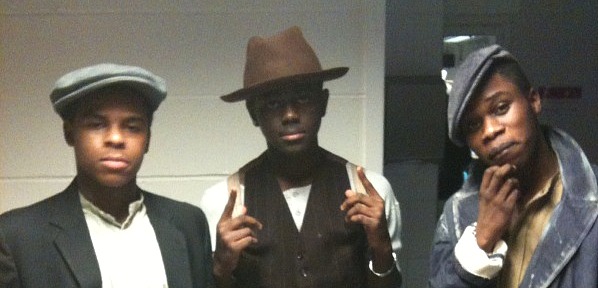BY SUSIE WILD ⋅ JANUARY 31, 2011 ⋅ POST A COMMENT
Butetown, Fri 28 Jan
words: SUSIE WILD
words: SUSIE WILD
★★★
Wales Millennium Centre: the space is in a nocturnal semi-darkness. We are ushered through customs and immigration, provided with boarding passes and sent on to have our identity photographs taken by stern staff who scold us for impertinence, stating: ‘No scarves. No smiles. Control yourselves.’ Suitably dressed down, we depart Glanfa Hall for our “ships” following announcements over the tannoy. Outside we pass characters singing by an oil drum – ‘sitting on the dock of the TIGER bay…’ – to join the fleet of taxis waiting to take us on our onward journeys through Butetown and its history.
 Accompanied by friends and strangers, our taxi drivers deliver us the next and best chapter of the story as they chauffer us through the sights and streets of Butetown. The site-specific theatre happens both inside and outside the cab. Inside, the narrative unfolds like a radio play: A Yorkshire man called John is sent on a wild goose chase whilst looking for his birth father whom he has never met. Outside, illuminated scenes from both 1940s Tiger Bay and the radio story come to life amidst a modern day Butetown reality. We hear of the close-knit mix of multi-racial communities – the Welsh, the Somalis, the Yeminis and Greeks that all orginally inhabited the area – where everyone knew each other and each other’s business. It is shown in stark contrast to the modern state of affairs – Butetown divided, a mosaic community split up, bulldozed over or hidden away behind new flats and the concrete promenade of Lloyd George Avenue. It is a poignant piece, reminding us of the stark contrast of colourful old Tiger Bay and commercial Cardiff Bay today, but also pointing fingers at a larger social problem; that of disappearing communities and disconnection.
Accompanied by friends and strangers, our taxi drivers deliver us the next and best chapter of the story as they chauffer us through the sights and streets of Butetown. The site-specific theatre happens both inside and outside the cab. Inside, the narrative unfolds like a radio play: A Yorkshire man called John is sent on a wild goose chase whilst looking for his birth father whom he has never met. Outside, illuminated scenes from both 1940s Tiger Bay and the radio story come to life amidst a modern day Butetown reality. We hear of the close-knit mix of multi-racial communities – the Welsh, the Somalis, the Yeminis and Greeks that all orginally inhabited the area – where everyone knew each other and each other’s business. It is shown in stark contrast to the modern state of affairs – Butetown divided, a mosaic community split up, bulldozed over or hidden away behind new flats and the concrete promenade of Lloyd George Avenue. It is a poignant piece, reminding us of the stark contrast of colourful old Tiger Bay and commercial Cardiff Bay today, but also pointing fingers at a larger social problem; that of disappearing communities and disconnection.Outside the taxi cab, teenage boys shoot dice on the pavement, mothers push prams and gossip, and an unwitting public also become characters in this moveable stage. As our enjoyable visual and aural feast of a taxi ride comes to an end we discover that John’s father, affectionately nicknamed Old Tiger Bay, has died. We arrive at the Coal Exchange for the wake. A young couple hug each of us enthusiastically as we enter and thank us for coming. The vicar hands us a copy of a letter that John’s father had written to his son. The audience is then left to wander around aimlessly, a little lost, as we wait (and wait and wait) for the rest of the staggered taxi journeys to finish and for their passengers to disembark; the earlier momentum of the show having petered out before we even have chance to send off Old Tiger Bay with music ranging from divas to dancehall.
The writers have done their research: The stories used in The Soul Exchange are based on stories and characters collated from local residents, while members of the local community have volunteered to play minor roles from Welsh nans to immigration officers. On community involvement the project scores highly but in the use of amateurs its production strengths weaken. At the end of the show, in the hall of the Coal Exchange, the audience and cast join together to attempt to dance The Butetown Slide in rhythm. Unfortunately, much like the disparate parts of the rest of the show, while NTW may congratulate itself in briefly reconnecting the community, creatively the whole never quite manages to get back in step.
Comments